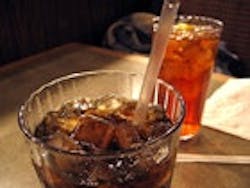Researchers Find Fecal Bacteria in Soda Fountain Beverages
A team of faculty and student scientists at Hollins University has discovered that beverages from soda fountain machines can harbor microorganisms that may contribute to episodic gastric distress in the general population and could potentially pose a more significant threat to people with compromised immune systems, according to their study.
The research team obtained 90 beverages of three types (sugar sodas, diet sodas and water) from 20 self-service and 10 personnel-dispensed soda fountains; analyzed them for microbial contamination; and evaluated the results with respect to U.S. drinking water regulations. A follow-up study compared the concentration and composition of microbial populations in 27 beverages collected from nine soda fountains in the morning and the afternoon.
“We obtained soda fountain beverages from a wide variety of fast food establishments and found that a significant number of the drinks had levels of bacteria, including coliforms, which would not be allowed in municipal drinking water,” said Renee Godard, Ph.D., professor of biology and director of environmental studies at Hollins and a co-author of the study. “To our knowledge, no one has looked at bacterial contamination from soda fountain machines before, and our results may have public health implications. They signal the need for regulations that enforce the manufacturer’s recommended cleaning regimens for these beverage dispensers.”
The research project also examined soda fountain-dispensed ice and none of the ice samples exceeded U.S. drinking water standards. Statistical analyses revealed no difference in levels of microbial contamination between beverage types, or between those dispensed from self-service and personnel-dispensed soda fountains.
Biology department faculty members Amy White and Rebecca Beach, and students Carolyn Belling and Vicki Kasza co-authored the study with Godard.
Source: Hollins University
